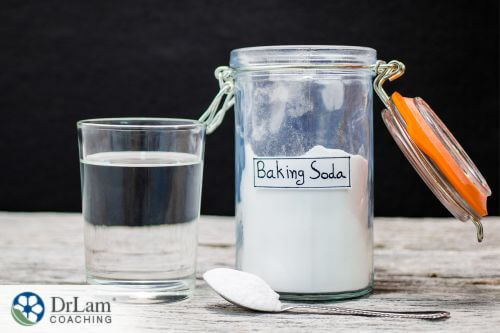 Heartburn can leave you feeling uncomfortable, and frequent heartburn can result in serious health complications. While your stomach can handle its acidic content, your esophagus can become irritated, and it’s also possible for injury to occur as well. However, many cases of heartburn can be prevented or alleviated if you have the know-how. If you suffer from heartburn, chances are, you can find help right there at home. The good news is that there are several home remedies that you can use to ameliorate your heartburn. One folk-remedy is milk, but does milk help heartburn? Here’s the research on milk for heartburn and several other effective natural heartburn remedies as well.
Heartburn can leave you feeling uncomfortable, and frequent heartburn can result in serious health complications. While your stomach can handle its acidic content, your esophagus can become irritated, and it’s also possible for injury to occur as well. However, many cases of heartburn can be prevented or alleviated if you have the know-how. If you suffer from heartburn, chances are, you can find help right there at home. The good news is that there are several home remedies that you can use to ameliorate your heartburn. One folk-remedy is milk, but does milk help heartburn? Here’s the research on milk for heartburn and several other effective natural heartburn remedies as well.
Heartburn is a common digestive condition that is characterized by a burning sensation in the chest. It stems from acid reflux, which occurs when gastric secretions from the stomach flow back into the esophagus. The lower esophageal sphincter, a ring-like muscle located where the esophagus leads into the stomach, normally stays closed except when you swallow, burp, or vomit. However, if it becomes weakened or dysfunctional, it can open and allow stomach acid into your esophagus. Heartburn symptoms can include a burning sensation in your chest, burning pain towards your throat, or a bitter or sour taste in your mouth. Depending on the underlying cause, heartburn can last from several minutes to a couple hours.
The answer to the question "does milk help with heartburn?" is: it depends.
While milk is packed with several important nutrients like calcium, vitamins D, A, B2, and B12, potassium, phosphorus, and protein, it may not be beneficial for heartburn. It all depends on the type of milk. There is whole milk with full-fat content, 2% fat, skim milk, and nonfat milk.
It may seem like cow’s milk cool, creamy, and thick quality could help coat the throat and stomach to alleviate heartburn.
However, research suggests that milk with higher fat content has the potential to worsen or trigger heartburn. The fat in milk can aggravate acid reflux by stimulating the stomach to create more acid.
However, according to research published in the journal Nutrition & Metabolism, nonfat milk can function as a temporary buffer between the lining of the stomach and acidic stomach contents, effectively providing immediate amelioration of heartburn symptoms.
If your body is sensitive to dairy products, you have a milk allergy, or you suffer from lactose intolerance, however, milk could increase inflammation or worsen symptoms, so it is best to stay away. However, there are many other natural remedies for heartburn that may work for you instead.
Several home remedies can be used to relieve your heartburn. You can use these remedies to calm an acid reflux flare-up.
Ginger is both alkaline and anti-inflammatory in nature. It can aid digestion and minimize the potential of stomach acid flowing back into your esophagus. Also, it may minimize symptoms of acid reflux, like inflammation. When your heartburn flares up, drink a cup of ginger tea to calm your acid reflux. For immediate relief from heartburn, you can also try eating a small piece of fresh ginger.
 Baking soda’s high alkaline pH makes it an effective heartburn relief option. Also, it can aid in neutralizing your stomach acid and stop acid reflux from occurring. Simply add roughly one-fourth of a teaspoon of baking soda to one glass of water to make the baking soda mixture. Drink it when you first begin to experience symptoms of heartburn. This is one of the fastest heartburn home remedies.
Baking soda’s high alkaline pH makes it an effective heartburn relief option. Also, it can aid in neutralizing your stomach acid and stop acid reflux from occurring. Simply add roughly one-fourth of a teaspoon of baking soda to one glass of water to make the baking soda mixture. Drink it when you first begin to experience symptoms of heartburn. This is one of the fastest heartburn home remedies.
Apple cider vinegar (ACV) is a kitchen staple that is useful in alleviating heartburn and poor digestion in some people. It helps to relieve the burning sensation of heartburn because, in some cases, heartburn is caused by too little stomach acid rather than too much. The stomach then churns more as it attempts to digest with inadequate acid. However, it’s important to note that some people may have a worsening burning sensation with ACV because of its acid content. Mix roughly half a teaspoon of unprocessed ACV with 3 tablespoons of water or tea and drink for fast relief of your heartburn.
According to an article in the journal Nutrients, aloe vera is believed to help alleviate GERD related symptoms. Some people use aloe vera juice as one of their home remedies for heartburn by taking it internally. Used in this way, some claim it reduces stomach acid and irritation. However, no scientific evidence backs this up. If you choose to use aloe vera juice, buy it only from a trusted source so you know you’re getting a safe product. Beware also of the amount of sugar content in aloe vera juice.
Lemon juice can be generally regarded as highly acidic. However, a small amount of lemon juice added to warm water and honey has an alkalizing effect. This helps to neutralize stomach acid. Furthermore, honey’s antioxidant properties help to protect your stomach lining.
Acidic juices, like pineapple juice and orange juice, can irritate your esophagus and worsen heartburn. However, low-acid fruit and vegetable juices are less likely to trigger heartburn. Research suggests that some people experience heartburn relief after drinking low-acid juices. Low-acid juices can include cabbage juice, melon juice, pear juice, celery juice, and carrot juice.
Pickle juice can be effective at relieving heartburn. It has a high vinegar content, making it acidic, and as such, it can help to enhance digestion and minimize heartburn that stems from too little acid. Furthermore, fermented sour pickle juice also contains probiotics that help improve digestion. Drink a few teaspoons of pickle juice after eating if you suffer from heartburn.
Licorice root tea has the potential to help ease your heartburn by increasing the mucosal lining of your esophagus. This may aid in protecting it from irritation that results from stomach acid.
Studies have shown that drinking water can help to alleviate heartburn. First, water dilutes stomach acid, minimizing the irritation of the esophagus, and in turn, minimizing the burning sensation in the chest that’s common in heartburn. Studies suggest that frequent sips of water can help to rid the esophagus of acid, which helps to prevent heartburn and avoid damage to the esophagus. Furthermore, research also indicates that drinking alkaline electrolyzed water with a modified pH can aid in neutralizing stomach acid, and relieving heartburn. However, keep in mind that cold water could contribute to throat irritation.
Aside from drinking milk to help with heartburn, there are foods that can aid too. This includes the following:
Peppermint can be either a benefit or a disadvantage depending on the person. It can aid in easing some digestive symptoms, partly because it’s effective at minimizing lower esophageal sphincter (LES) pressure, which has the potential to send acidic stomach contents flowing back into your esophagus. However, it may worsen heartburn as well. Peppermint may loosen the lower esophageal sphincter in some people, increasing acid reflux.
 Banana is rich in fiber, and its potassium content makes it a fairly alkaline food. As such, bananas are a good food to counter the stomach acid that irritates your esophagus. Also, bananas are believed to aid in stopping gastrointestinal spasms as well. Unlike milk, bananas can also create a useful coat-like effect on your throat that can provide relief for your heartburn symptoms.
Banana is rich in fiber, and its potassium content makes it a fairly alkaline food. As such, bananas are a good food to counter the stomach acid that irritates your esophagus. Also, bananas are believed to aid in stopping gastrointestinal spasms as well. Unlike milk, bananas can also create a useful coat-like effect on your throat that can provide relief for your heartburn symptoms.
Eating a handful of oily almonds can bring relief from heartburn for many people. In addition, eating almonds will speed up your digestion. To use this remedy, eat three or four almonds right after a meal. Chew them until they turn into a paste to release their oil.
Flaxseed contains fiber mucilage, which turns into a gel in water. It soothes your digestive tract. In addition, flaxseed contains alpha-linoleic acid (ALA) which protects the lining of your stomach. This means flaxseed soup can help ease your heartburn.
To make this soup, mix 1 tbsp of flax seeds and one cup of water in a small pan. Cook this over low heat until the mixture thickens. Remove from heat and cool for 5 minutes. You can mix in raw honey to taste, along with one-quarter tsp of cinnamon.
Chewing gum aids in stimulating saliva production, which can help to minimize the level of acid in your esophagus. This, in turn, can relieve your heartburn. Buy sugar-free brands of gum that won’t result in added irritation or exacerbate your heartburn symptoms. However, be advised that gum may also increase heartburn in some people.
Licorice root is a traditional herbal remedy that could help relieve your occasional heartburn. A 2017 study suggested that herbal formulas with licorice consistently supported heartburn relief, much more so than common antacids. However, consuming an excess of licorice could potentially raise your blood pressure, reduce your potassium levels, and interfere with the effectiveness of particular medications. As such, first, speak with your doctor before taking licorice supplements. Adrenal Gut Restore by Dr. Lam® features a blend of Licorice and Aloe Vera, both of which have a long history of use in traditional medicine for their gut-soothing properties. Licorice can support the mucosal lining of the gut, potentially aiding in the healing of leaky gut or other intestinal permeability issues. Aloe Vera is renowned for its healing effects, which can assist in repairing damaged gut lining. Together, these ingredients aim to create a supportive environment for gut repair.
Eating roasted fennel seeds is a beneficial home remedy for heartburn. It’s effective because of several compounds that are found in fennel seeds that aid in regulating the production of stomach acid. Also, drinking fennel tea made from fennel seeds can be beneficial for heartburn relief. All you need are two teaspoons of fennel seeds added to one cup of boiling water, seeped for ten minutes, and then strained to get rid of the seeds. Drink your fennel tea and watch your heartburn symptoms go away.
Mustard seeds are a fast-acting home remedy. It aids in neutralizing stomach acid that causes the burning sensation that accompanies heartburn. Also, mustard seeds help you to better digest your food by strengthening the digestive organs. You can swallow two teaspoons of yellow mustard seeds with a glass of water. However, be mindful not to chew the seeds. Additionally, if you have mustard paste, you can mix two teaspoons of it into a glass of buttermilk. You can drink this once or twice daily for quick heartburn relief.
Used for centuries as one of the home remedies for heartburn, slippery elm thickens the mucous lining in your stomach to protect against acid. To use this remedy, mix one teaspoon of slippery elm powder in a cup of hot water. Drink it after meals and at bedtime.
Aside from milk for heartburn and other food choices, lifestyle changes plays a pivotal role as well. You might want to consider the following:
 You increase your risk of heartburn by eating larger meals. The reason you get heartburn after eating too much is that your stomach stays distended when large amounts of food are in it. Controlling your portions can help reduce stomach size and heartburn. If you need help with reducing portions, talk to a dietitian about portion control and remedying your heartburn.
You increase your risk of heartburn by eating larger meals. The reason you get heartburn after eating too much is that your stomach stays distended when large amounts of food are in it. Controlling your portions can help reduce stomach size and heartburn. If you need help with reducing portions, talk to a dietitian about portion control and remedying your heartburn.
Being overweight can trigger heartburn and reflux disease, according to research. Your diaphragm, a muscle just above your stomach, serves to strengthen your lower esophageal sphincter. Additionally, it aids the lower esophageal sphincter in keeping stomach acid where it should be. When you are overweight, too much fat sits around your midsection, and this sphincter can shift up, away from your diaphragm. This condition is called a hiatal hernia. Acid reflux is produced by this hernia and makes heartburn more likely to occur.
Both tobacco and alcohol are two substances that increase your risk of heartburn. They tend to increase the production of stomach acid, relax the lower esophageal sphincter, and prevent your esophagus from clearing itself of acid.
Stress, particularly chronic stress, can lead to heartburn, digestive issues, and adrenal fatigue. Adrenal Fatigue Syndrome (AFS) is the non-Addison's form of adrenal dysfunction, where the body's stress response cannot keep up with life's chronic stressors. It results from your adrenal glands becoming overburdened and fatigued from chronic stress and the demand for cortisol and other stress-fighting hormones. The NeuroEndoMetabolic (NEM) Stress Response, which comprises six interrelated circuits made up of three organs or systems each, helps your adrenals fight the effects of stress on your body. The inflammation circuit works overtime to react to constant stress, which can lead to heartburn.
Chest pain, which is a symptom of heartburn, can also cause some serious concern in people who suffer from AFS. The involvement of the heart in the Cardionomic circuit can make AFS patients hypersensitive to symptoms that may relate to their heart. However, the chest pain connected to heartburn doesn’t signal a problem with the heart. Medical professionals call this noncardiac chest pain. Yet, AFS sufferers may interpret it as a heart attack. This creates anxiety, which adds to the existing stress faced by AFS sufferers, further burdening the adrenal glands. Furthermore, the medications for heartburn can also be a source of stress. This makes taking steps to reduce stress essential to managing heartburn.
Heartburn medications may prove effective, but they can also have negative side effects. As such, home remedies for heartburn are such an important alternative. However, do note that each of these remedies may work better for some people than others. You may need to try different remedies, and work with your doctor to determine the cause of your heartburn. Rest assured, however, that heartburn is not something you just have to endure.
Herdiana, Yedi. "Functional Food in Relation to Gastroesophageal Reflux Disease (GERD)." Nutrients, vol. 15, no. 16, 2023, https://www.unboundmedicine.com/medline/citation/37630773/Functional_Food_in_Relation_to_Gastroesophageal_Reflux_Disease_(GERD).
Schulz, Rebekah M., et al. "Effectiveness of Nutritional Ingredients on Upper Gastrointestinal Conditions and Symptoms: A Narrative Review." Nutrients, vol. 14, no. 3, 2022, https://www.researchgate.net/publication/358411232_Effectiveness_of_Nutritional_Ingredients_on_Upper_Gastrointestinal_Conditions_and_Symptoms_A_Narrative_Review.
Zhang, Xingxia et al. “Milk consumption and multiple health outcomes: umbrella review of systematic reviews and meta-analyses in humans.” Nutrition & Metabolism, vol. 18(1):7, 7 Jan. 2021, https://pubmed.ncbi.nlm.nih.gov/33413488/.
If you’ve been wondering, “does milk help heartburn?” the answer is yes, as long as it is fat-free milk. But other home remedies may be even more helpful. These include drinking baking soda mix, apple cider, aloe vera juice, water, and herbal teas, as well as eating bananas, and some herbal supplements.
